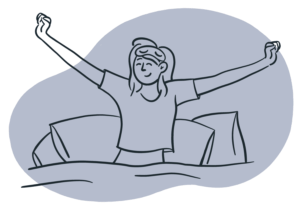The Insomnia Guide
Disclosure: By clicking on the product links in this article, Mattress Nerd may receive a commission fee at no cost to you, the reader. Read full disclosure statement.
Sometimes the Sandman feels like an elusive beast. From a stressful deadline to a new schedule, there are plenty of things that can disrupt your rest. But if you find sleepless nights becoming a regular occurrence, you may be dealing with a common sleep disorder called insomnia.
What is Insomnia?
Insomnia is a sleep disorder that can make it difficult to fall asleep, stay asleep, or both. That means not even the perfect bedroom temperature or the softest sheets can lull you to dreamland, making good quality sleep downright impossible.
If insomnia lasts a few days or weeks, it’s considered a short-term case. Usually, this lack of sleep is brought on by stress or other lifestyle changes like a new schedule. People with chronic insomnia (also called primary insomnia) deal with at least 3 sleepless nights a week for over 3 months.
It’s frustrating not to be able to sleep, but persistent insomnia can also lead to a number of other health problems. It has even been linked to an increased risk of death.
Symptoms of Insomnia
Not getting the recommended 7 hours of sleep every night can leave you feeling pretty crummy during the day. People with insomnia may experience some common symptoms, including:
- Feeling tired or fatigued during the day
- Waking up at unintentional times, such as too early or in the middle of the night
- Waking up feeling unrested
- Having difficulty falling asleep
- Struggling to concentrate or focus
- Difficulty remembering things
- Increased irritability
- Increased accidents or mistakes
- Anxiety or depression
Causes of Insomnia
This is where things can get tricky. Insomnia could occur on its own, or it could be a symptom of a different underlying health condition. There’s no one-size-fits-all answer, and it can be difficult to get to the root of the issue.
Behavioral Factors
Some lifestyle factors can make you more susceptible to insomnia.
- Stress: Major life events, like a job loss or the death of a loved one, can keep you up at night. Even everyday pressures, like work deadlines or relationship troubles, can mess with your sleep.
- New schedules: If you’re a shift worker, have a new baby, or recently traveled to a different time zone, your body might not be used to your current sleep patterns.
- Poor sleep hygiene: Your habits and behaviors surrounding sleep can have a big impact on your ability to fall asleep. Things like looking at a laptop or phone, watching television, or drinking caffeine too close to bedtime can all disrupt your internal clock.
- Eating too late: More research is needed, but some studies suggest that munching on a big dinner right before bed could affect your sleep quality.
Health Conditions
In some cases, an underlying health condition might be to blame for your insomnia symptoms.
- Anxiety
- Depression
- Cancer
- Chronic pain from arthritis or fibromyalgia
- Gastrointestinal issues (including heartburn)
- Hormone fluctuations from menstruation, menopause, or thyroid disease
- Certain medications
- Alzheimer’s disease
- Parkinson’s disease
- Sleep apnea
- Restless legs syndrome (RLS)
- Substance abuse
Risk Factors for Insomnia
While anyone can develop insomnia, certain groups are at a higher risk, including:
- Women
- Pregnant women
- Adults older than 60
- People with mental health or physical illnesses
- People under chronic stress
- People with constantly changing schedules
Diagnosis
There’s no one-stop way to test for insomnia yet. If you’re struggling to get a good night’s sleep, a great first step is to schedule an appointment with your primary care physician.
During this initial visit, your doctor will likely ask you about your sleep habits. They may ask how many hours you sleep each night, when you go to bed and wake up, and whether you have any difficulty falling or staying asleep. Your doctor might also ask about your medical history and review any medications you’re taking that could interfere with sleep.
If a simple medication change or lifestyle shift doesn’t improve your snooze, your doctor can refer you to a sleep specialist to complete testing. They will likely:
- Order a blood test to see if thyroid problems or low iron levels are the blame.
- Ask you to keep a sleep diary for one to two weeks to look for any potential sleep-inhibiting patterns.
- Ask you to complete a sleep study called a polysomnogram to check for sleep apnea.
Treatment Options
Depending on the cause, it might be possible to address insomnia symptoms with lifestyle changes. However, if tactics like building better sleep habits and reducing stress aren’t helping, there are other treatment options out there.
Cognitive Behavioral Therapy for Insomnia
Also known as CBT-I, this nonpharmacological treatment focuses on identifying and changing negative thought patterns or behaviors that might be disrupting your sleep. Essentially, you’ll work with a therapist to retrain your brain to better prepare for sleep.
CBT-I can be a powerful alternative to medication.
Prescription Medication
Sleeping pills aren’t the first choice for treating insomnia, but they can be effective when used as directed. Some prescription medications have been approved for long-term use, such as:
- Eszopiclone (Lunesta)
- Ramelteon (Rozerem)
- Zaleplon (Sonata)
- Zolpidem (Ambien, Edluar, Intermezzo, Zolpimist)
Talk with your doctor about the side effects and risks of each of these medications before starting a new sleep aid.
Living with Insomnia
Addressing the root cause of your insomnia can take some time. You’ll have to rule out health conditions, experiment with lifestyle changes, and document your sleep patterns to zero in on a solution.
While you’re working through those steps, there are ways to try to get your best rest, even when living with this sleep disorder.
- Create an optimal sleep environment. Sleep experts say that people sleep best in temperatures between 60 and 67 degrees. So turn the thermostat down and make sure your bedroom is dark, cool, and quiet.
- Follow a regular sleep schedule. Going to bed at the same time each night and waking up at the same time each morning can help regulate your body’s internal clock.
- Avoid caffeine and alcohol before bed. Both of these substances can interfere with sleep.
Takeaway
We all need sleep to function properly. But for some people, getting a good night’s rest is easier said than done.
If you’re struggling with insomnia, talk with your doctor. They can help you understand what’s causing your symptoms and find a treatment plan that works for you.
Source List
Chung N, et al. (2020). Does the Proximity of Meals to Bedtime Influence the Sleep of Young Adults? A Cross-Sectional Survey of University Students. https://www.ncbi.nlm.nih.gov/pmc/articles/PMC7215804/
Cleveland Clinic. (2020). Insomnia. https://my.clevelandclinic.org/health/diseases/12119-insomnia
Cleveland Clinic. (2021). What’s the Best Temperature for Sleep? https://health.clevelandclinic.org/what-is-the-ideal-sleeping-temperature-for-my-bedroom/
How Much Sleep Do I Need? (2017). https://www.cdc.gov/sleep/about_sleep/how_much_sleep.html
Mayo Clinic. (2022). Insomnia: Overview: https://www.mayoclinic.org/diseases-conditions/insomnia/symptoms-causes/syc-20355167
Mayo Clinic. (2022). Insomnia: Diagnosis and treatment. https://www.mayoclinic.org/diseases-conditions/insomnia/diagnosis-treatment/drc-20355173
National Heart, Lung, and Blood Institute. (2022). What Is Insomnia? https://www.nhlbi.nih.gov/health/insomnia
Parthasarathy S, et al. (2015). Persistent Insomnia is Associated with Mortality Risk. https://www.sciencedirect.com/science/article/abs/pii/S0002934314009140
Rossman J. (2019). Cognitive-Behavioral Therapy for Insomnia: An Effective and Underutilized Treatment for Insomnia. https://www.ncbi.nlm.nih.gov/pmc/articles/PMC6796223/


